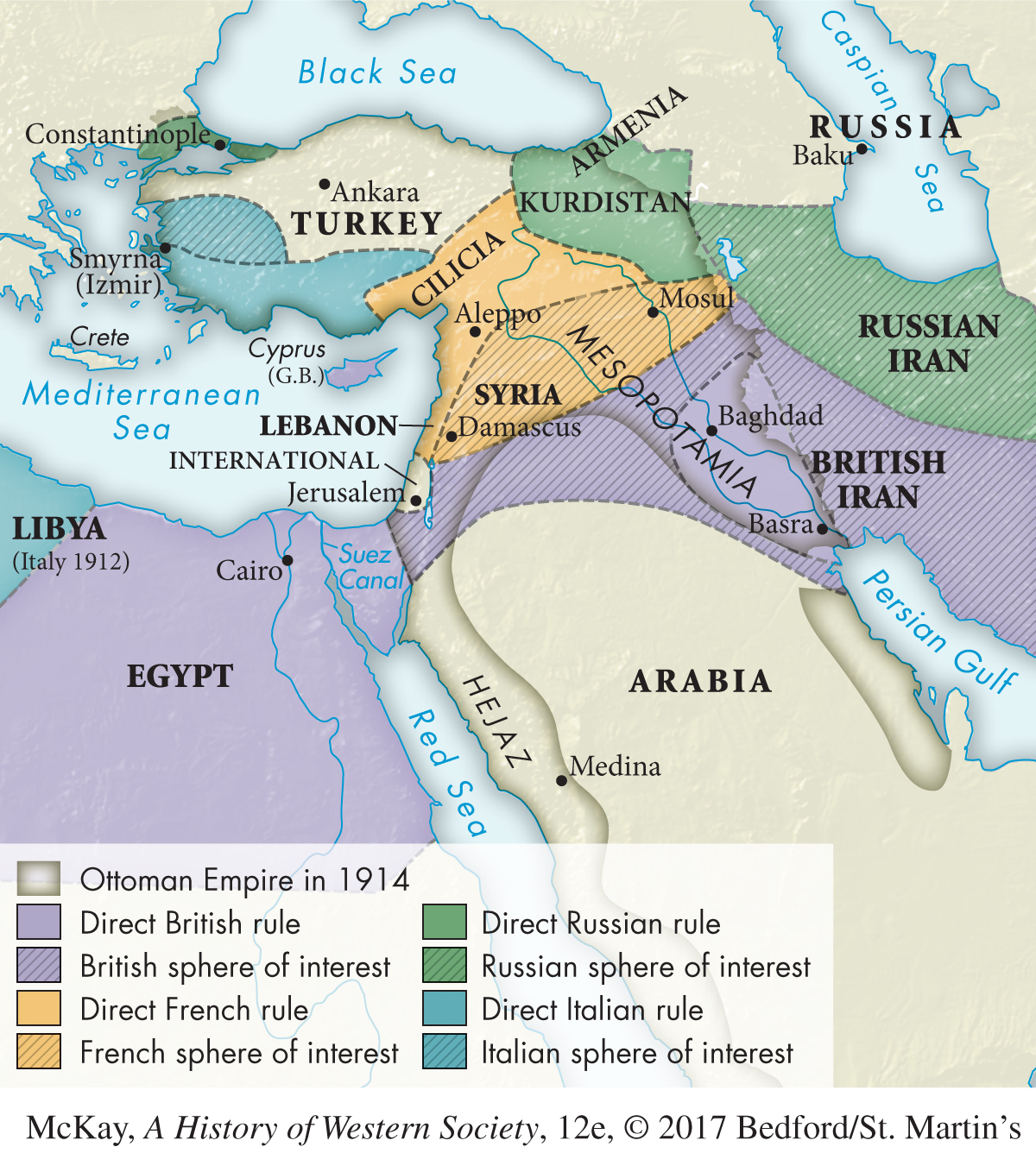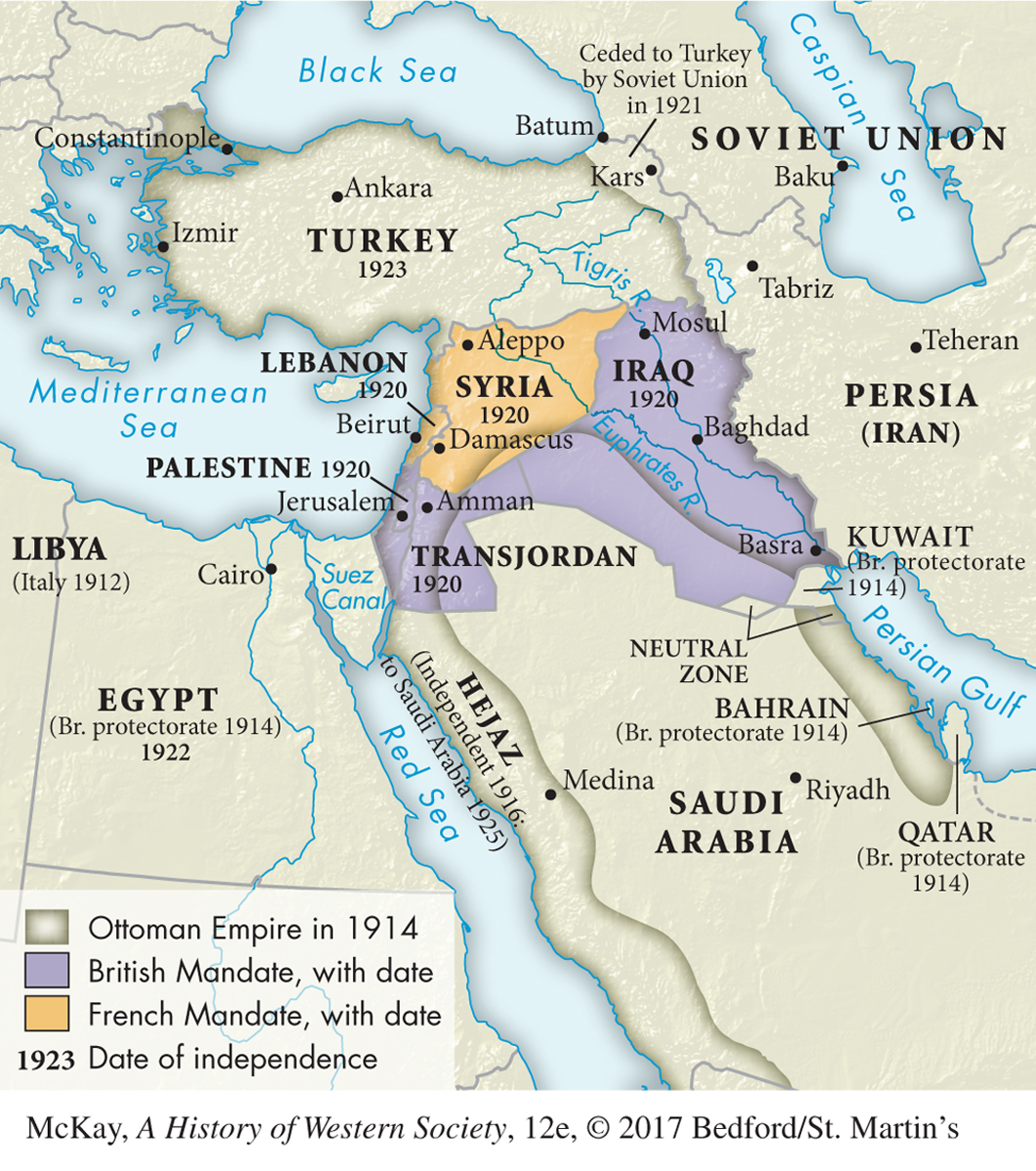A History of Western Society: Printed Page 858
Thinking Like a Historian
The Partition of the Ottoman Empire and the Mandate System
During and after the First World War, representatives of the Entente governments made various agreements to carve up Ottoman territories into spheres of interest and “mandates,” managed much like colonies by the European powers. Such agreements were subject to competing claims and criticism, including wartime strategic needs, Zionist desires for an independent state in Palestine, and Arab aspirations for national independence. The outcome satisfied no one. What were the mandate system’s strengths and weaknesses?
| 1 |
Resolution of the General Syrian Congress at Damascus, July 2, 1919. President Woodrow Wilson insisted at Versailles that the right of self- |
![]() We the undersigned members of the General Syrian Congress . . . provided with credentials and authorizations by the inhabitants of our various districts, Moslems, Christians, and Jews, have agreed upon the following statement of the desires of the people of the country who have elected us to present them to the American Section of the International Commission. . . .
We the undersigned members of the General Syrian Congress . . . provided with credentials and authorizations by the inhabitants of our various districts, Moslems, Christians, and Jews, have agreed upon the following statement of the desires of the people of the country who have elected us to present them to the American Section of the International Commission. . . .
1. We ask absolutely complete political independence for Syria within these boundaries. [Request includes the present-
2. We ask that the Government of this Syrian country should be a democratic civil constitutional Monarchy on broad decentralization principles, safeguarding the rights of minorities, and that the King be the Emir Faisal, who carried on a glorious struggle in the cause of our liberation and merited our full confidence and entire reliance.
3. Considering the fact that the Arabs inhabiting the Syrian area are not naturally less gifted than other more advanced races and that they are by no means less developed than the Bulgarians, Serbians, Greeks, and Romanians at the beginning of their independence, we protest against Article 22 of the Covenant of the League of Nations, placing us among the nations in their middle stage of development which stand in need of a mandatory power. . . .
7. We oppose the pretensions of the Zionists to create a Jewish commonwealth in the southern part of Syria, known as Palestine, and oppose Zionist migration to any part of our country; for we do not acknowledge their title but consider them a grave peril to our people from the national, economical, and political points of view. Our Jewish compatriots shall enjoy our common rights and assume the common responsibilities. . . .
The noble principles enunciated by President Wilson strengthen our confidence that our desires emanating from the depths of our hearts, shall be the decisive factor in determining our future; and that President Wilson and the free American people will be our supporters for the realization of our hopes, thereby proving their sincerity and noble sympathy with the aspiration of the weaker nations in general and our Arab people in particular.
| 2 | Article 22 of the Covenant of the League of Nations, ratified January 1920. In one of its first acts, the League of Nations defined the terms of the mandate system, under which the victors in the First World War would govern territories disrupted by the war, primarily former lands of the Ottoman and German Empires. |
![]() To those colonies and territories which as a consequence of the late war have ceased to be under the sovereignty of the States which formerly governed them and which are inhabited by peoples not yet able to stand by themselves under the strenuous conditions of the modern world, there should be applied the principle that the well-
To those colonies and territories which as a consequence of the late war have ceased to be under the sovereignty of the States which formerly governed them and which are inhabited by peoples not yet able to stand by themselves under the strenuous conditions of the modern world, there should be applied the principle that the well-
The character of the mandate must differ according to the stage of the development of the people, the geographical situation of the territory, its economic conditions and other similar circumstances. Certain communities formerly belonging to the Turkish Empire have reached a stage of development where their existence as independent nations can be provisionally recognized subject to the rendering of administrative advice and assistance by a Mandatory until such time as they are able to stand alone. The wishes of these communities must be a principal consideration in the selection of the Mandatory.
| 3 | Entente proposals for the partition of the Ottoman Empire, 1915–1917. In secret treaties and agreements negotiated during the war, Britain, France, Russia, and Italy planned to divide up the territories of the Ottoman Empire. |

| 4 | The partition of the Ottoman Empire, 1914–1923. The division of the Ottoman Arab states between Britain and France and the creation of a separate Palestinian state under British mandate would set the stage for decades of conflict. |

| 5 | The British mandate for Palestine, July 24, 1922. The League of Nations granted Britain the mandate for Palestine, a disputed territory that included significant Christian, Jewish, and Islamic holy territories and sites. |
![]() Whereas His Britannic Majesty has accepted the Mandate in respect of Palestine and undertaken to exercise it on behalf of the League of Nations in conformity with the following provisions. . . .
Whereas His Britannic Majesty has accepted the Mandate in respect of Palestine and undertaken to exercise it on behalf of the League of Nations in conformity with the following provisions. . . .
Article 1. The Mandatory shall have full powers of legislation and of administration [in Palestine].
Article 2. The Mandatory shall be responsible for placing the country under such political, administrative, and economic conditions as will secure the establishment of the Jewish National Home . . . and the development of self-
Article 4. An appropriate Jewish Agency shall be recognized as a public body for the purpose of advising and co-
Article 6. The Administration of Palestine, while ensuring that the rights and position of other sections of the population are not prejudiced, shall facilitate Jewish immigration under suitable conditions and shall encourage, in co-
ANALYZING THE EVIDENCE
- Compare and contrast the maps in Sources 3 and 4. What are the key differences? What historical events account for these differences?
- In Source 1, why do the representatives at the Syrian Congress appeal to the “noble principles” associated with U.S. president Wilson? How did the mandate system deal with demands for national self-
determination? - The sources above present contradictions that proved difficult if not impossible for contemporary negotiators to resolve. What were the sticking points? In what ways did the partition of the Ottoman Empire leave unresolved problems for future generations?
PUTTING IT ALL TOGETHER
Notions of national self-
Sources: (1) “Resolution of the General Syrian Congress at Damascus, 2 July 1919,” from the King-